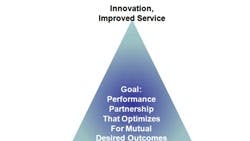The Outsourcing Paradox
No matter why a firm outsources, almost all have a room for improvement. We have been researching companies that outsource as part of a two-year research project at the University of Tennessee. The primary finding is that the outsourcing arrangement is often conceived with fundamental flaws in the business model, the relationship, and the contract structure that results in what we call perverse incentives. We like to think of these flaws in an outsourcing arrangement as diseases that can potentially infect an outsourcing relationship. Our research has uncovered several common flaws (or diseases) found in traditional outsourcing arrangements. This article outlines two of the most frequent flaws.
The Outsourcing Paradox
One of the most interesting of the diseases we uncovered is what we refer to as the Outsourcing Paradox. Our research found that many companies fall into a trap of trying to develop the "perfect" set of tasks for their outsource manufacturer -- with detailed requirements, frequencies and measures. The result is an impressive document containing all the possible details on how the work is to be done. However, this "perfect system" is often the first reason that the company will fail in its outsourcing effort. That's because it's the company's perfect system, not one designed by the provider of the services.
For example, during a site visit to a 3PL that provides warehousing of spare parts, we saw approximately eight people servicing a facility that on average had less than 75 orders for spare parts per day. When asked why all the resources, the manager responded "that is what the client company requires per our statement of work -- so I have staffing at that level to meet the contract requirements."
We are continually amazed to find that companies have chosen to outsource to the "experts" -- yet define the requirements and work scope so tightly that the outsource manufacturer winds up executing the same old inefficient processes!
The Activity Trap
A second disease that we commonly find is what we have come to call the Activity Trap. Traditionally, companies that purchase outsourced services use a transaction-based model, where the manufacturer is paid for every transaction -- regardless of whether or not it is needed. There simply is no incentive for the outsource manufacturer to reduce the number of non-value-added transactions because a reduction of transactions would translate to a reduction of revenue. Even if the outsource manufacturer's profit is a fixed-profit amount, the typical outsource manufacturer will be penalized for investing in process efficiencies to drive costs down.
The table below outlines some typical reactions we have seen as a result of the Activity Trap from companies that outsource their manufacturing.
| Company outsourcing for 3rd-party-logistics services | Outsource manufacturer's typical reaction under a Transaction-Based Model |
| I forecast over. | We charge you to store and count your product monthly... the more you have the more we make. |
| I forecast under. | We charge rush fees to expedite your products to market. |
| I manage my suppliers poorly. | Your suppliers caused us to rework your product into new packaging. We have to charge you more money to rework. |
| Inventory working capital is killing me. | We don't own your inventory... we just provide services to you. Actually, we like when you have too much because we charge to hold it. |
| I specified the wrong shipping requirements. | We ship as we are told. You didn't tell us about the special label. |
| Source: Supply Chain Visions | |
The Need for a Better Approach: The Rise of PBO
In a PBO agreement, regardless of what is being outsourced, the outsourcing partner has the ability to earn additional financial value (e.g. more profit) by contractually committing to achieve the desired outcomes. Simply stated -- if the outsource manufacturer achieves the desired outcomes (achieves results) -- they receive a bonus. Note -- it is important to understand that PBO is NOT gainsharing.
It's important to digest that PBO is much more than doing an activity at a higher level of service. PBO is a fundamental business model paradigm shift in how the outsourcing company and the service manufacturers do business.
Note: The authors have published a free book on their findings available at http://PBOResources.utk.edu. The University of Tennessee Center for Executive Education also has launched a new 2&1/2-day class on the topic of Performance-Based Outsourcing: Buying Results, Not Activities! For more information, please visit http://PBO.utk.edu
Kate Vitasek is faculty member in the University of Tennessee Center for Executive Education and founder of Supply Chain Visions. Mike Ledyard is with Supply Chain Visions.
For over 30 years, University of Tennessee (UT) has played a major role in the areas of supply chain/logistics; supply chain certification; lean; process improvement; executive education; and leadership development -- conducting innovative research, publishing leading-edge findings, writing industry-standard textbooks and creating benchmarks.
Interested in information related to this topic? Subscribe to our weekly Value-chain eNewsletter.
